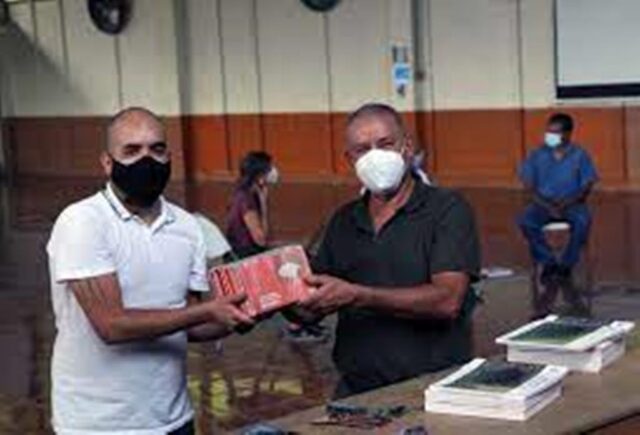The Special Rapporteur of the United Nations (UN) on the rights of indigenous peoples, Francisco Calí Tzay, of the Mayan Cakchiquel ethnic group and born in Guatemala, made an academic visit to our country from August 20 to 25, invited from the University of Costa Rica (UCR).
Calí visited the Boruca and Rey Curré territories where he was presented with various projects that the UCR has developed in conjunction with these communities. In addition, he held a meeting with indigenous university students from the University of Costa Rica (UCR) and the National University (UNA) who shared their vision on the problems they and their communities face in the current context of the COVID-19 pandemic.
On Friday, August 20, in the Boruca territory communal hall, the rapporteur learned about three projects from the Faculty of Medicine, one from the Faculty of Letters and two projects from the South Headquarters that contribute to improving the quality of life of indigenous peoples from the South.
On Saturday, August 21, at the Rey Curré communal hall, the Vice-rector’s Office for Social Action gave him an account of the work carried out since 2012 by the Network of Indigenous Peoples and Territories (RIPI) within the framework of the National Plan for Indigenous Safeguarding. of the commitment that the University has assumed to improve the access of this population to higher education.
Knowledge exchange and health
Among the Health projects, ED-3451 stands out. Capacity building in Primary Health Care in the Ngnobe population of the South Zone, within which an initiative for the prevention of COVID-19 has been carried out. This includes the elaboration of informative material and the manufacture of cloth masks with traditional motifs, a work carried out in conjunction with indigenous health assistants from the C.C.S.S. and community seamstresses.
After learning about this project, the Rapporteur recognized the importance of this alternative response that adds to the indigenous peoples’ own knowledge of dealing with Covid-19. “With this experience we see that the accompaniment of this scientific knowledge of indigenous peoples and academic knowledge of the “new world” is an almost perfect combination to be able to face Covid-19,” he said.
The microbiologist Dr. Jorge Vargas Carmiol and physician Dr. Jean Carlo Segura Aparicio, along with the indigenous health assistants of the C.C.S.S., Zelmira Pérez Hernández and Cornelio Bejarano Quintero, also presented the TC-719. Prevention of emerging and reemerging parasites, which has contributed to significantly reduce diseases in this population.
They also talked about the ED-3227 project: “Meeting of Knowledge between allopathic medicine and traditional indigenous medicine of the Ngöbe population”, which made it possible to create a glossary of medical terms in Ngäbe and Spanish so that doctors can communicate with patients of this ethnicity and vice versa.
“We work with cultural advisers and indigenous leaders. Among them, traditional doctors and midwives, where we seek the exchange of knowledge” explained Dr. Segura. In this regard, Dr. Vargas emphasized that through the exchange between indigenous doctors and doctors and midwives they manage to generate new knowledge in the conjunction of both scientific aspects.

Preserving the cultural and linguistic heritage
The South Headquarters was present with two projects in charge of the anthropologist M.Sc. Ana Patricia Rojas Hernández. EC-410. Golfito, cultura y más and the TC-589 Cultural Promotion Center, which work with the Boruca and Gnöbe indigenous peoples, in places such as La Casona, Las Vegas, Salitre and Rey Curré accompanying the communities in the conservation of cultural heritage of the region.
During the day, some results of the project ED-408 Linguistic Diversity of Costa Rica were also shown, through which didactic materials have been developed that collect knowledge of the Costa Rican indigenous peoples in their own languages. For example: a series of illustrated ethnographic encyclopedias on topics such as food, agriculture, manufactured things, plants and textiles.
Among the projects of the Network of Indigenous Peoples and Territories (RIPI) of the VAS, led by Lic. Alejandra Guevara Chaves, highlighted that of Student Tutoring in Indigenous Territories, which seeks to improve their opportunities of access to higher education, through Academic support in subjects such as biology, English, Spanish, civics, social studies and mathematics, as well as vocational guidance, a project that was part of the Five-Year Plan for Indigenous Peoples and Territories of the National Council of Rectors (CONARE) 2015-2019.
After learning about all these university initiatives, the rapporteur was very pleased to see “the effort they are making and the success they are having” and interested in sharing these experiences in other parts of the world. Mr. Francisco Calí also expressed his interest in returning to Costa Rica on an official visit that would allow him to learn more about the realities of the Costa Rican indigenous peoples.
“I think this visit is very important because we need support in working with communities …
“I believe that this visit is very important because we need support in working with indigenous communities, that the work we do is visualized and that the community also gives its contribution to the rapporteur on the needs they are facing,” commented the M.SC.
The meeting with the students took place in the Boruca community hall. There, they talked with the rapporteur on various issues of the reality that young people from the different Costa Rican indigenous territories live. At the end of the meeting, Mr. Calí congratulated them on their level of language and ideas and encouraged them to continue with their professional preparation: “Keep going with your preparation and don’t forget where you come from, because you prepare to serve his people!” he told them.
For Sirleny Ortiz Ortiz, from the indigenous community of Salitre and a student at the South Headquarters, this space for dialogue was of great importance. “It is a way for us to share our reality as students and people from a territory where there are problems and we experience situations that other people do not know, and sharing these with such an important person as the Rapporteur is of great importance to us.”
The academic visit of the special rapporteur of the United Nations (UN) on the rights of indigenous peoples, Francisco Calí Tzay, ended on Monday, August 23 with the lecture he gave in the Aula Magna, of the University of Costa Rica (UCR) called “Covid-19: Effects of the pandemic on the individual and collective rights of indigenous peoples”.

